The Role of Permits and Regulations in Concrete Driveway Installation
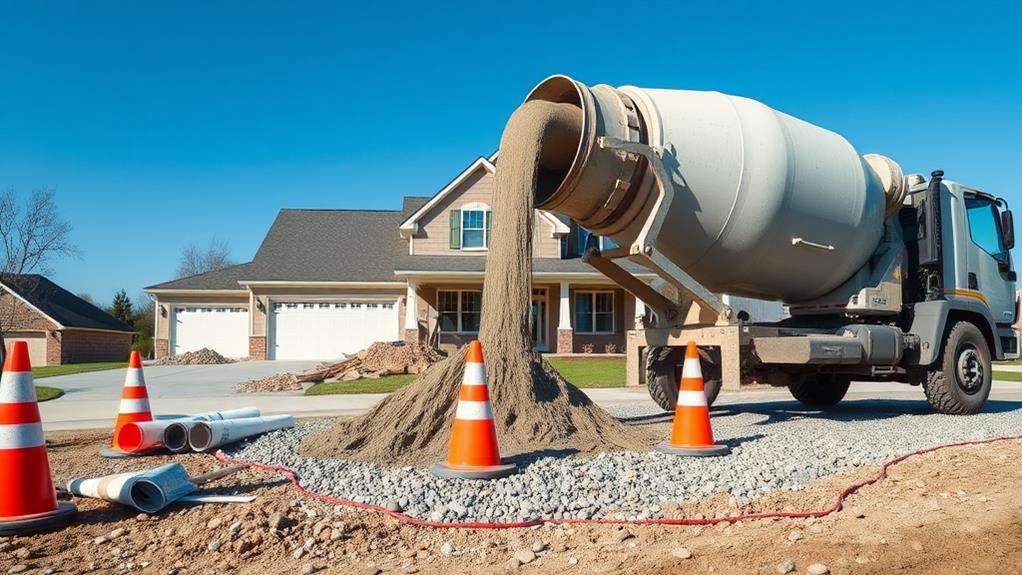
When you're planning to install a concrete driveway, you might be tempted to skip the permitting process and dive right in. However, permits and regulations play an essential role in ensuring your project's success and compliance. You'll find that maneuvering these requirements isn't just about red tape; it's about protecting your investment and the community. From environmental considerations to structural integrity, there's more to a concrete driveway than meets the eye. As you consider the steps ahead, you'll want to understand how these regulations can actually benefit you and your property in the long run.
Concrete Contractor Highlights
- Permits ensure compliance with local building codes, zoning laws, and safety regulations for concrete driveway installations.
- The permitting process involves submitting detailed plans, property information, and contractor details to local authorities for review.
- Obtaining proper permits protects homeowners from legal issues and facilitates inspections to ensure quality and durability.
- Regulations address environmental concerns, including runoff management and the use of eco-friendly materials in driveway construction.
- Permits and regulations help maintain property values by ensuring all concrete driveways meet established standards and specifications.
Concrete Contractor Services Residential And Commercial
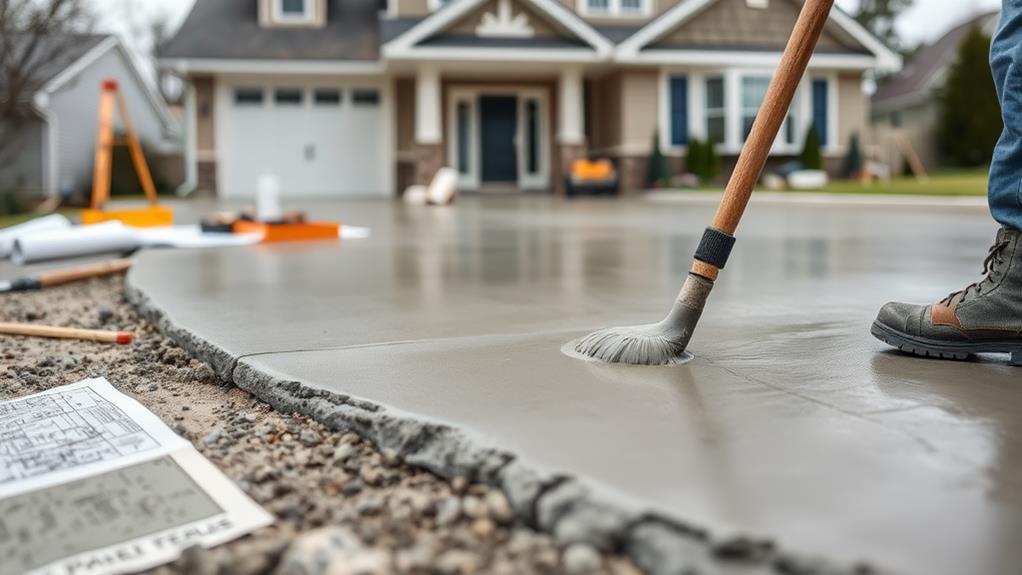
Our experienced concrete contractors offer full services for both residential and commercial properties, specializing in driveway installation and repair. With decades of industry expertise, our team is extensively trained and certified in the latest concrete techniques and technologies.
We provide expert consultation, custom design options, and high-quality workmanship to guarantee your concrete driveway meets your specific needs and enhances your property's value. Our team uses industry-leading techniques and materials to create durable, long-lasting driveways that can withstand heavy traffic and various weather conditions.
From initial site preparation to the final finishing touches, we handle every aspect of the installation process with precision and care. Whether you need a new driveway for your home or a large-scale commercial project, our skilled professionals are equipped to deliver exceptional results that exceed your expectations.
Permit Application Process
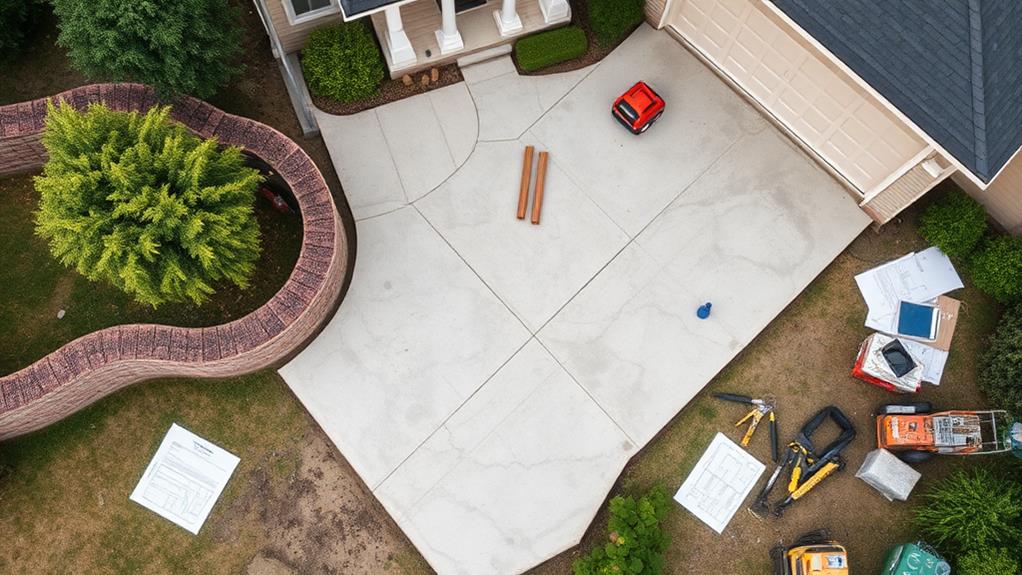
Before beginning your concrete driveway installation project, you'll need to navigate the permit application process, which is a vital step in ensuring compliance with local regulations. Consider consulting with experts who've local expertise for guidance on Twin Cities, MN climate and regulations, which can impact your project.
You'll be required to gather and submit specific documentation and forms, which typically include detailed plans of the proposed driveway, property information, and contractor details. Understanding the submission and processing timeline, as well as the associated fees and available payment methods, will help you effectively manage your project's schedule and budget while adhering to all necessary legal requirements.
Required Documentation and Forms
Traversing the permit labyrinth is a key step in your concrete driveway installation journey. To successfully navigate this process, you'll need to gather and submit specific documentation and forms.
Typically, you'll be required to provide a detailed site plan, which should include the proposed driveway's dimensions, location relative to property lines, and any existing structures. You'll also need to submit architectural drawings or blueprints that illustrate the driveway's design, including cross-sections and drainage plans.
Additionally, you may be asked to furnish proof of property ownership, such as a deed or tax assessment. Many jurisdictions require a completed permit application form, which often includes questions about the project's scope, estimated cost, and contractor information. You might also need to provide evidence of contractor licensing and insurance.
Some municipalities may request a soil report or geotechnical analysis, particularly if your property is in an area prone to soil instability. It's essential to check with your local building department for a complete list of required documents, as requirements can vary greatly between jurisdictions.
Submission and Processing Timeline
Once you've gathered all the necessary documentation, you'll need to understand the timeline for submitting and processing your permit application. The process typically begins with submitting your completed forms and supporting documents to your local building department. You'll want to make certain everything is accurate and complete to avoid delays.
After submission, the review process commences. This can take anywhere from a few days to several weeks, depending on your local government's workload and the complexity of your project. During this time, officials will scrutinize your plans for compliance with zoning laws, building codes, and safety regulations. They may request additional information or clarification if needed.
If your application meets all requirements, you'll receive approval and can proceed with your concrete driveway installation. However, if there are issues, you might need to revise and resubmit your application. It's imperative to factor this potential back-and-forth into your project timeline. By staying proactive and responsive throughout the process, you'll help guarantee a smoother, more efficient permitting experience, allowing you to join the ranks of homeowners with properly approved concrete driveways.
Fees and Payment Methods
Securing a permit for your concrete driveway installation comes with associated costs. You'll need to be prepared to pay various fees, which can differ depending on your location and the scope of your project. These fees typically cover the administrative costs of processing your application, conducting inspections, and ensuring compliance with local regulations.
Most municipalities offer multiple payment methods to accommodate your preferences. You'll likely have the option to pay by check, credit card, or sometimes even online through a secure portal. It's crucial to inquire about the accepted payment methods when submitting your application to avoid any delays in processing.
Some jurisdictions may have a tiered fee structure based on the size or complexity of your driveway project. Additionally, you might encounter separate fees for initial application review, plan checks, and final inspections. Be sure to request a detailed breakdown of all associated costs to budget accordingly. In some cases, you may be required to pay a deposit or bond, which is refundable upon successful completion and approval of your concrete driveway installation. Always keep your receipts and payment confirmations for your records.
Benefits
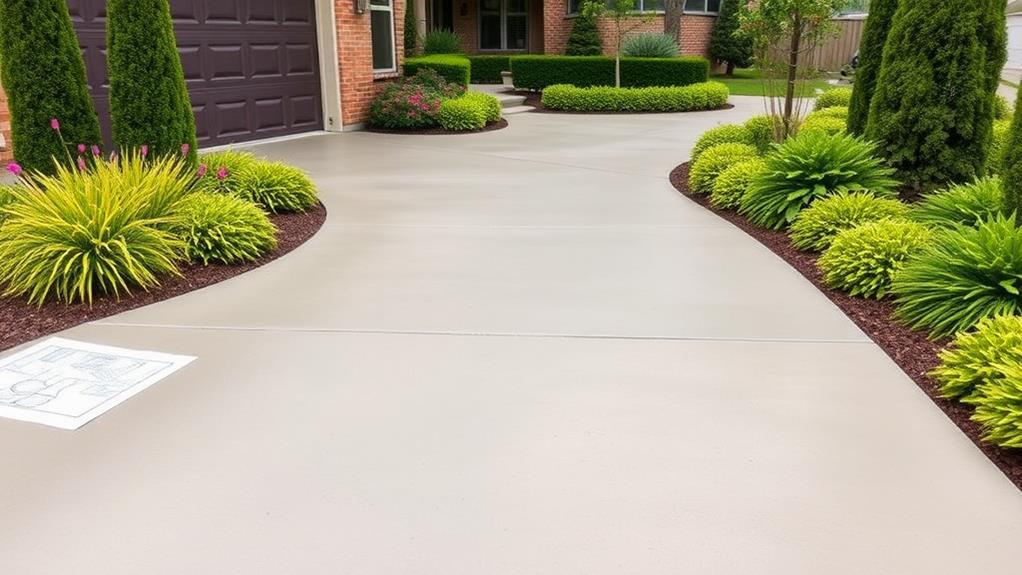
When you choose to install a concrete driveway, you're not only enhancing your property's aesthetics but also reaping numerous benefits that extend far beyond visual appeal. Concrete is known for its durable performance, with the ability to last 30-40 years and withstand extreme weather conditions, providing a long-term solution that's both cost-effective and low maintenance.
Ensures Safety Standards Compliance
Professional concrete driveway installation goes hand in hand with ensuring safety standards compliance. When you choose a reputable contractor, you're not just getting a new driveway; you're investing in peace of mind. These experts are well-versed in local building codes and regulations, ensuring that your project meets all necessary safety requirements.
Your driveway isn't just a path for vehicles; it's an integral part of your property's infrastructure. Proper installation includes considerations for drainage, load-bearing capacity, and environmental impact. A professional team will assess factors such as soil composition, climate conditions, and potential hazards to design a driveway that's not only aesthetically pleasing but also structurally sound and safe for years to come.
Protects Property Value
A well-installed concrete driveway isn't just about safety; it's a smart investment in your property's value. When you follow proper permitting and regulatory processes, you're ensuring that your driveway meets local standards and adds legitimate value to your home. This adherence to regulations can considerably impact your property's appraisal and marketability.
Consider the long-term benefits of a properly permitted driveway. You're not only avoiding potential legal issues but also creating a documented history of improvements. This documentation can be invaluable when it's time to sell your home, as it demonstrates your commitment to maintaining and enhancing the property. Potential buyers and their agents often scrutinize these details, viewing them as indicators of overall home quality and care.
Moreover, a driveway installed with proper permits typically undergoes inspections during the construction process. These inspections serve as quality control measures, ensuring that the work meets specific standards for durability, drainage, and aesthetics. By investing in a properly permitted and regulated concrete driveway, you're not just improving your home's curb appeal; you're making a strategic decision that can yield substantial returns in your property's overall value and desirability in the real estate market.
Facilitates Proper Planning
Before breaking ground, proper planning for your concrete driveway installation sets the stage for a successful project. Obtaining the necessary permits and adhering to local regulations guarantee that your driveway meets all legal requirements and standards. This process facilitates a thorough approach to planning, allowing you to ponder vital factors such as property lines, drainage, and environmental impact. By engaging with local authorities and understanding the regulations, you'll gain valuable insights into best practices and potential challenges specific to your area.
The permit application process encourages you to thoroughly assess your project's scope, timeline, and budget. You'll need to provide detailed plans, including dimensions, materials, and construction methods. This level of preparation helps you anticipate potential issues and make informed decisions about your driveway's design and functionality. Additionally, working within the regulatory framework often involves consultations with professionals, such as surveyors or engineers, who can offer expert advice to optimize your driveway's performance and longevity. Ultimately, the planning process guided by permits and regulations not only guarantees compliance but also contributes to a well-executed project that enhances your property's value and functionality.
Promotes Environmental Responsibility
Environmental stewardship plays a pivotal role in concrete driveway installation. When you adhere to permits and regulations, you're not just following the law; you're actively participating in protecting our shared environment. These guidelines often incorporate measures to mitigate runoff, preserve local ecosystems, and reduce the overall ecological impact of construction activities.
By obtaining the necessary permits, you're ensuring that your project aligns with local environmental standards. This process often includes assessments of soil composition, drainage patterns, and potential impacts on nearby water sources. You'll be required to implement erosion control measures, such as silt fences or sediment basins, which prevent contamination of local waterways. Additionally, regulations may mandate the use of eco-friendly materials or techniques that minimize carbon emissions during the installation process.
Your commitment to following these environmental regulations contributes to the broader community effort in preserving natural resources. It demonstrates your responsibility as a property owner and sets a positive example for others in your neighborhood. By prioritizing environmental considerations in your concrete driveway installation, you're not only enhancing your property but also safeguarding the local ecosystem for future generations.
Concrete Curing Time Requirements
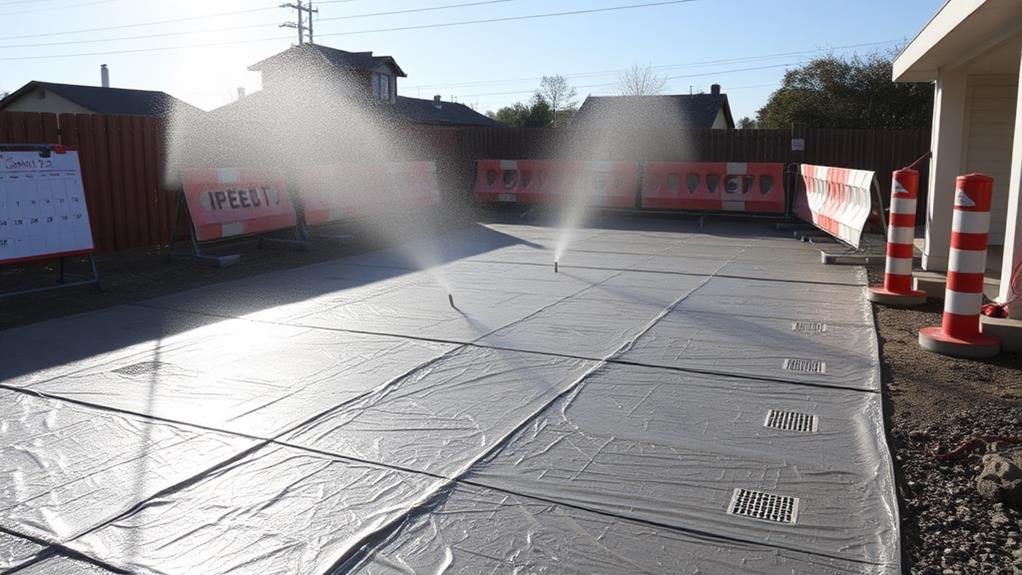
When installing a concrete driveway, understanding the curing process is vital for ensuring its longevity and durability. You'll need to ponder the minimum curing duration, which can vary based on environmental factors such as temperature and humidity. It's necessary to restrict traffic during this pivotal period to allow the concrete to develop its full strength and resistance to wear.
| Temperature Range (°F) | Minimum Curing Time | Light Traffic | Heavy Traffic |
|---|---|---|---|
| 50-70 | 7 days | 10 days | 28 days |
| 70-90 | 5 days | 7 days | 21 days |
| 90+ | 3 days | 5 days | 14 days |
| Below 50 | Consult professional | Consult professional | Consult professional |
Minimum Curing Duration
Allowing enough time for your concrete driveway to cure is essential for its long-term strength and durability. The minimum curing duration for your new concrete driveway typically ranges from 7 to 10 days, depending on various factors such as weather conditions, concrete mix design, and the intended use of the driveway. During this critical period, you'll need to protect the surface from foot traffic, vehicles, and excessive moisture or dryness.
It's important to understand that while the concrete may appear dry after 24 to 48 hours, it hasn't reached its full strength yet. You'll want to keep the surface moist for the first few days by periodically spraying it with water or covering it with plastic sheeting. This process, known as moist curing, helps the concrete develop its maximum strength potential.
After the initial curing period, you can begin using your driveway for light foot traffic, but it's advisable to wait at least 28 days before subjecting it to heavy vehicle loads. By adhering to these minimum curing requirements, you're ensuring that your investment in a concrete driveway will provide lasting value and performance for years to come.
Temperature Impact Factors
Temperature plays a crucial role in determining the curing time for your concrete driveway. As a homeowner beginning this project, you'll need to consider how ambient temperatures impact the curing process. When temperatures are higher, typically above 70°F (21°C), your concrete will cure more rapidly, potentially allowing for earlier use of the driveway.
However, excessively hot conditions can lead to rapid moisture evaporation, potentially causing surface cracking and compromising the overall strength of the concrete.
Conversely, cooler temperatures will extend the curing time. If the temperature drops below 50°F (10°C), the chemical reactions necessary for proper curing slow down considerably. In extreme cases, near-freezing temperatures can halt the curing process entirely, leading to structural weaknesses.
You'll need to work closely with your contractor to determine the best time for pouring, taking into account both short-term and long-term weather forecasts. They may recommend using special additives or curing compounds to mitigate temperature-related issues. By understanding these temperature impact factors, you'll be better equipped to guarantee your concrete driveway achieves its maximum strength and durability, aligning with local regulations and industry best practices.
Traffic Restriction Periods
Understanding temperature's impact on curing is just part of the equation. You'll also need to contemplate traffic restriction periods, which are indispensable for ensuring your new concrete driveway reaches its full strength potential. These periods, often referred to as concrete curing time requirements, vary depending on several factors, including the specific mix design and environmental conditions.
Typically, you'll need to restrict foot traffic for at least 24 hours after pouring. For vehicle traffic, you're looking at a minimum of 7 days, though many professionals recommend waiting up to 28 days for maximum strength development. During this time, it's vital to protect the surface from heavy loads, excessive moisture, and rapid drying. You'll want to follow your contractor's specific guidelines, as they'll have tailored recommendations based on your project's unique characteristics.
Concrete Contractor FAQ
Can I Install a Concrete Driveway Myself Without a Permit?
You shouldn't install a concrete driveway without a permit. It's risky and could lead to fines or legal issues. As a responsible homeowner, you'll want to check local regulations and obtain necessary permits before starting your project.
How Long Does It Typically Take to Obtain a Driveway Installation Permit?
You'll typically wait 2-4 weeks for your driveway permit. Don't worry, though! It's a common process we all go through. While you're waiting, you can start planning and preparing for your exciting new project.
Are There Specific Environmental Regulations for Concrete Driveway Installations?
You'll face environmental regulations for your concrete driveway installation. They often cover stormwater management, erosion control, and tree protection. Check with your local authorities to guarantee you're complying with all the rules in your area.
What Happens if I Install a Driveway Without Proper Permits?
If you install a driveway without proper permits, you're risking fines, legal trouble, and potential removal orders. You'll also face difficulties selling your home later. It's best to follow regulations and join your community in responsible construction practices.
Do I Need Separate Permits for Drainage Systems in My Concrete Driveway?
You'll likely need separate permits for drainage systems in your driveway. It's best to check with your local authorities to guarantee you're following all regulations. Don't worry; they'll guide you through the process, keeping you in the loop.
